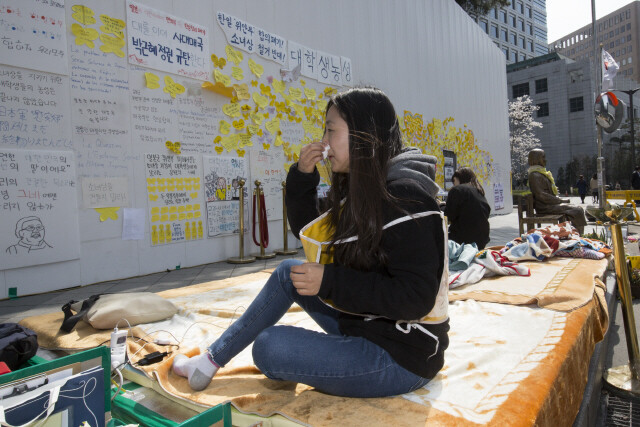hankyoreh
Links to other country sites 다른 나라 사이트 링크
Student booked by police for participating in vigil for comfort women

A university student who has taken part in the candlelit vigils protesting the agreement between South Korea and Japan over the so-called comfort women issue has been booked by the police for the first time. The police’s declaration that the vigils and press conferences are unauthorized demonstrations is being criticized as an arbitrary application of the law that violates the freedom to assemble and demonstration.
On Apr. 4, the Jongno Police Department announced that it had booked a 22-year-old named Hong without detention and handed the case to the prosecutors. The police are recommending that the prosecutors indict Hong for organizing an unauthorized demonstration at the statue of a young woman symbolizing the comfort women across from the Japanese Embassy in Seoul, which they say is a violation of the Assembly and Demonstration Act.
Hong was the emcee at a candlelit vigil - officially called a “cultural festival” - calling for the revocation of the comfort women agreement that was held on Jan. 4, with about 100 people in attendance.
While Article 15 of the Assembly and Demonstration Act classifies assemblies related to academic studies, art, sports, religion, ceremony, friendship and entertainment as “cultural festivals” which do not need to be reported to the police, the police concluded that the assembly in question was not a cultural festival but rather a demonstration.
“At the assembly, they were chanting slogans expressing opposition to the comfort women agreement. Since the attendees at the assembly expressed their opinions, we concluded that it was a demonstration,” said an officer at the Jongno Police Department.
The police generally define demonstrations as assemblies at which the participants express their opinions or further their aims, and cultural festivals as those at which they do not. As such, the police tend to view events at which the participants shout political slogans or wave placards as being demonstrations.
This was the logic that the police used when they launched an investigation into the “Third Nationwide Rally Cultural Festival” that was held at Gwanghwamun Plaza in Seoul on Dec. 19 of last year, which they declared to be a “disguised illegal demonstration.”
“The boundaries between a cultural festival, a press conference and a demonstration are ambiguous. Chanting slogans or waving placards is just one part of the event. It’s not right to single out that one part and declare that the whole event was a demonstration,” said Kim Nam-geun, an attorney for MINBYUN-Lawyers for a Democratic Society.
“Whether it’s a cultural festival or a demonstration, application of the Assembly and Demonstration Act should be grounded in the possibility of the event in question creating a threat to public peace and order,” said Han Sang-hui, a professor at the law school of Konkuk University.
By Ko Han-sol, staff reporter
Please direct questions or comments to [english@hani.co.kr]

Editorial・opinion
![[Column] Has Korea, too, crossed the Rubicon on China? [Column] Has Korea, too, crossed the Rubicon on China?](https://flexible.img.hani.co.kr/flexible/normal/500/300/imgdb/original/2024/0419/9317135153409185.jpg) [Column] Has Korea, too, crossed the Rubicon on China?
[Column] Has Korea, too, crossed the Rubicon on China?![[Correspondent’s column] In Japan’s alliance with US, echoes of its past alliances with UK [Correspondent’s column] In Japan’s alliance with US, echoes of its past alliances with UK](https://flexible.img.hani.co.kr/flexible/normal/500/300/imgdb/original/2024/0419/2317135166563519.jpg) [Correspondent’s column] In Japan’s alliance with US, echoes of its past alliances with UK
[Correspondent’s column] In Japan’s alliance with US, echoes of its past alliances with UK- [Editorial] Does Yoon think the Korean public is wrong?
- [Editorial] As it bolsters its alliance with US, Japan must be accountable for past
- [Guest essay] Amending the Constitution is Yoon’s key to leaving office in public’s good graces
- [Editorial] 10 years on, lessons of Sewol tragedy must never be forgotten
- [Column] A death blow to Korea’s prosecutor politics
- [Correspondent’s column] The US and the end of Japanese pacifism
- [Guest essay] How Korea turned its trainee doctors into monsters
- [Guest essay] As someone who helped forge Seoul-Moscow ties, their status today troubles me
Most viewed articles
- 1[Column] The clock is ticking for Korea’s first lady
- 2After 2 months of delayed, denied medical care, Koreans worry worst may be yet to come
- 3Hong Se-hwa, voice for tolerance whose memoir of exile touched a chord, dies at 76
- 4[Column] Has Korea, too, crossed the Rubicon on China?
- 5US overtakes China as Korea’s top export market, prompting trade sanction jitters
- 6Samsung barricades office as unionized workers strike for better conditions
- 7[Editorial] As it bolsters its alliance with US, Japan must be accountable for past
- 8[Correspondent’s column] In Japan’s alliance with US, echoes of its past alliances with UK
- 9All eyes on Xiaomi after it pulls off EV that Apple couldn’t
- 10[Correspondent’s column] The US and the end of Japanese pacifism